The unusual employment agency Losseklubben af 1944 at the port of Esbjerg has just celebrated its 75th anniversary. It represents some 200 dock workers, of whom 130 are employed on a casual basis. Via the agency, the companies at the port hire staff at hours’ – and occasionally only minutes’ – notice. The dock workers themselves believe that they have survived within the industry for so many years primarily by being ‘flexible specialists’.
They don’t know their working hours or their pay till the end of the day. In fact, they turn up without knowing if they have any work at all.
All the same, many would not swap their existence as casual dock workers for anything.
“It becomes a way of life and a part of you,” explains Brian Reichle. He has worked at the port for over thirty years and is the manager of Losseklubben af 1944, organising the work for the dock workers at the port.
On this day, we are sitting in the muster office at the port of Esbjerg and there are some one hundred men present in orange work clothes. It is Friday at 13.00 and they have gathered because the weekend work will be distributed; on the blackboard, there are jobs which the companies at the port have rung in.
‘Saturday @ 13.00, DFDS, Hawser. Sunday, car team of about 30 men’ are among the jobs listed. The majority of those present are members of permanent teams of five. When the permanent teams on duty have had jobs assigned, the foreman distributes the remaining jobs among the casual workers present. The whole thing is conducted in near silence. He distributes the work in a barely audible voice.
The foreman is called Rene, though he answers to Basse, and as there is quickly only one crane job left this Saturday, two men will have to draw lots about who gets it, using a pack of cards. The loser will then have to be off involuntarily. No pay that day.
That is the procedure every day when jobs at the port are being distributed. You turn up at the muster office and hopefully you will get a job. And the following day, it starts all over again.
“We joke a bit about it and say that we get fired every single day,” explains Reichle.
There are three muster calls on Fridays. The first is at 7.00, the second at 10.00 and the third call is at 13.00 when the weekend jobs are distributed.
During this week, there was work for 70–80 men every day, except Friday morning which was a bit quiet. This meant that many of those who turned up had to return home without a job unless they decided to stay at the muster office, relaxing with their colleagues. A highly unusual situation for by far the majority of wage earners. But the members of Losseklubben af 1944 are quite happy with the arrangement.
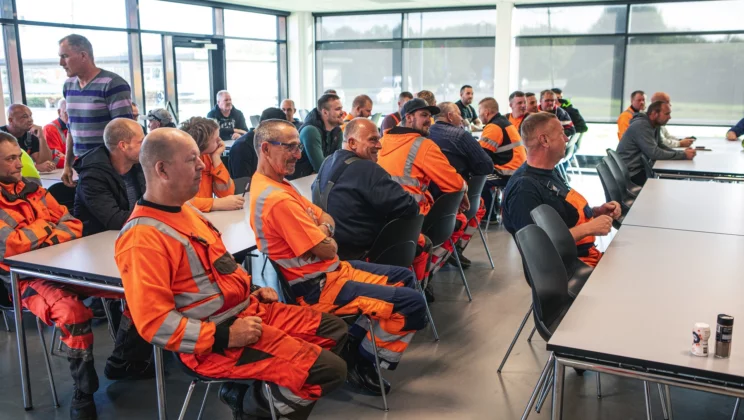
The dock workers gather to distribute the jobs at the muster office at Port Esbjerg.
Same method as 150 years ago
The one hundred men wearing orange work clothes arrive quietly just before 13.00.
When turning up for muster calls, they are part of a very old tradition at the port.
“Arrangements have remained practically unchanged for more than a century,” explains Reichle. The only difference is that now the employers do not turn up to select their workers. The distribution of jobs is now organised through Losseklubben af 1944.
This is also part of the reason why they are a happy bunch at the muster office on that Friday afternoon in September.
“The story about the casual workers at the port of Esbjerg is not a story of people in dire straits on the edge of the labour market, eking out an existence as casual workers because they have no choice. It is the story about happy people who love coming to work. It is 60 per cent lifestyle and 40 per cent work,” he says.
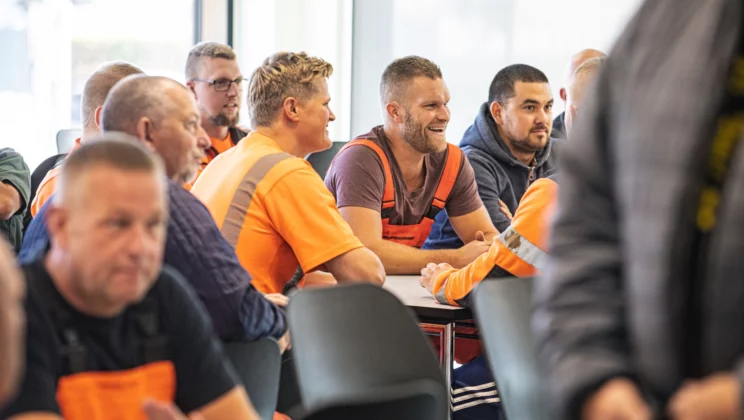
There is a happy feeling in the muster office.
Arrangement typical of a sharing economy
According to Port Esbjerg’s CEO, Dennis Jul Pedersen, the arrangement at the port is an example of an efficient, flexible labour force which typifies the modern concept of a sharing economy.
“Even though Losseklubben af 1944 is 75 years old, it is a good example of a sharing economy. The companies at the port share not only electric cars but also staff. The arrangement with the dock workers shows how it increases flexibility and efficiency – two parameters which are crucial for the operations at a busy port,” explains Jul Pedersen. He believes that the dock workers are unique.
“The dock workers’ Losseklubben af 1944 is one of a kind in Denmark. When companies are able to hire labour at hours’ notice on a short-term basis, the individual companies do not need to employ their own dock workers. Instead, all the companies at the port share the labour made available by this unusual employment agency. It is unique,” he continues.
According to Jul Pedersen, the arrangement has also meant that the dock workers in Esbjerg have become among the most efficient in Europe. They move 100 trailers an hour when ships are loaded and unloaded, and they also hold the world record for the highest number of offshore wind turbines, having handled more than 20 Gigawatt out of the port of Esbjerg.
“It’s no mean feat. Those components are extremely heavy and they must be handled with care, as damage must be avoided,” says Jul Pedersen.
Collaborative partnership
Losseklubben af 1944 is a strong organisation and the members are used to being told that they are difficult. They think differently.
“We are very flexible. The companies can call us even after muster and still get assistance on that day,” says Reichle.
He also thinks that they have a great collaborative partnership with Port Esbjerg. Reichle and Jul Pedersen meet once a month for a proactive chat about challenges and solutions.
Reichle also believes that Losseklubben af 1944 has an excellent relationship with the various companies at the port.
“Problems do arise from time to time, but we always manage to sort things out. If we have an issue, I meet with the company over coffee within the week and we generally find a solution,” says Reichle.
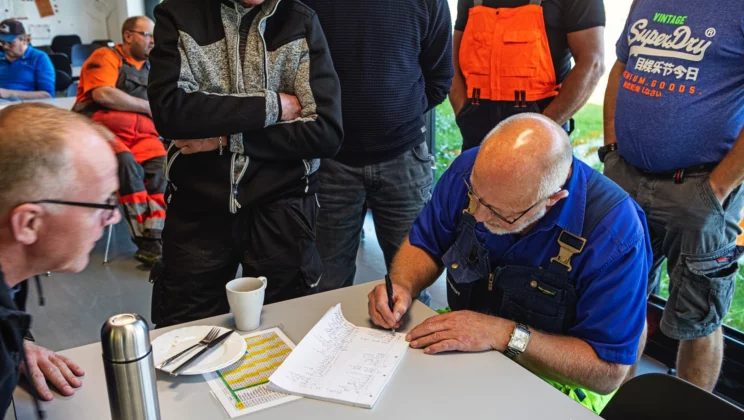
It is no longer the employers that get to choose the workers, but the members of Losseklubben af 1944 themselves.
At the port
High above the port, Jørgen is sitting in a crane adeptly controlling its movements. At the crack of dawn, he was hired to load a number of containers on to the Eurus Express from Fredericia together with the company’s, Nor Sea’s, permanent employees. He operates efficiently the Liebherr 280 crane and manages to place a couple of containers safely and securely on to the deck in time for lunch at 12.00.
The jobs at the port vary a great deal, and the members of Losseklubben af 1944 have generally no idea what they will be doing from one day to the next. In the old days, they would have carried sides of pork and sacks of potatoes, but that type of lifting belongs in the past. There is much more machinery at the port now; the members help load or unload wind turbine blades, move packing pallets, assist the cranes and not least help move the 70,000 cars which arrive at the port every year. The greatest challenge is probably moving turbine components which never seem to stop growing.
“For example, we have just arranged for ten men to be specially trained in driving SPMTs to move nacelles,” says Brian Majland, who is the chairman of the National Dock Workers’ Union (Havnearbejdernes Landsklub) and is also working at the port of Esbjerg.
He believes that the dock workers at the port of Esbjerg have over time become unique.
“We are flexible specialists,” he says.
While in the past, dock workers were unskilled labourers, these days the situation is very different.
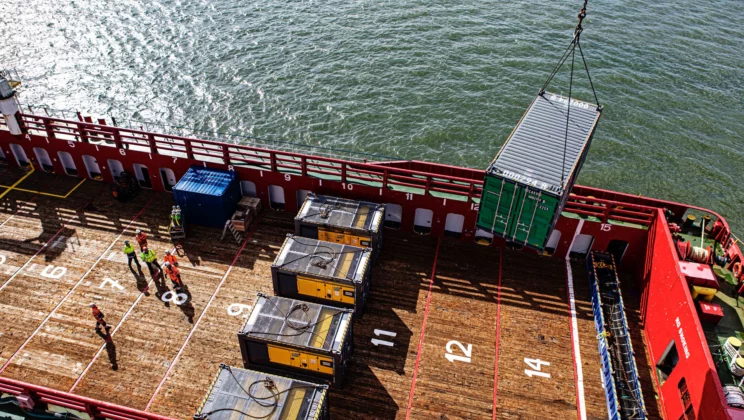
Jørgen from Losseklubben af 1944 has been hired to operate the crane.
Apprenticeship programme
Originally, the port of Esbjerg was an export port and it subsequently became a fishing port. It has evolved immensely over the years and the port today handles wind turbine components, oil and RoRo.
The demands on the dock workers have changed and nowadays they are not required to carry fifty-kilo sacks of potatoes on their backs.
“This is not routine manual work for idiots, and there is much less space for eccentric characters on the edge of society. We are not morons, standing around swearing and drinking beer,” says Reichle with a wry smile.
Increasing demands on dock workers’ skill sets prompted Losseklubben af 1944 to take part in an initiative some ten years ago to establish an apprenticeship programme for dock workers. The first group of 16 men completed the Apprenticeship Programme for Port and Terminal Workers (Havne- og Terminal Uddannelsen) in 2012.
A great deal of persuasion was needed – not just to get the companies to embrace the idea, but also the dock workers themselves.
According to Majland many dock workers have no fond memories of their school years.
“Many were either bullied or did not fit in at school. They have a fear of the classroom, so it was a struggle to convince them that the programme was a good idea,” he says.
Brian Heise, who took part in establishing the programme via 3F Transport (the United Federation of Danish Transport Workers) in Esbjerg, agrees, but he has also experienced the pride of some of the dock workers who have completed the programme, just over 130 so far, once they received their apprenticeship certificates.
“It is not really about getting the extra four Danish kroner an hour. It is the professional pride that they gain. And then of course they do in fact increase their skills. The demands on dock workers keep growing,” he explains.
The Apprenticeship Programme for Port and Terminal Workers takes two to three years to complete, and the subjects include driving, safe loading, handling and hooking, IT at the port and communication. A Certificate of Apprenticeship is awarded upon successful completion of the programme.
The programme also ensures that the dock workers engage with the jobs they take on as collaborative partners, for example in relation to safety:
“After all, we engage our own brains when we get a job and share our concerns with the client, if necessary. Our own safety is obviously at stake, but we are also thinking of the expensive cargo we are handling,” explains Majland.
There are not jobs for everybody
“SHUT UP,” shouts Rene – or Basse - to his friends. The last muster call of the day is not over yet and we need silence in the room, so the weekend jobs can be distributed in good order. It is the author of this article who has been speaking too loudly and has now been put in his place.
There are not jobs for everybody on that day, and some dock workers will have to go home disappointed.
“We don’t know what the future will bring or even if we will have any work for the next three months. But it’s our way of life and we are dealing with it,” says Reichle.
If a dock worker has to return home without work, he may qualify for supplementary daily benefit paid by the Danish state.
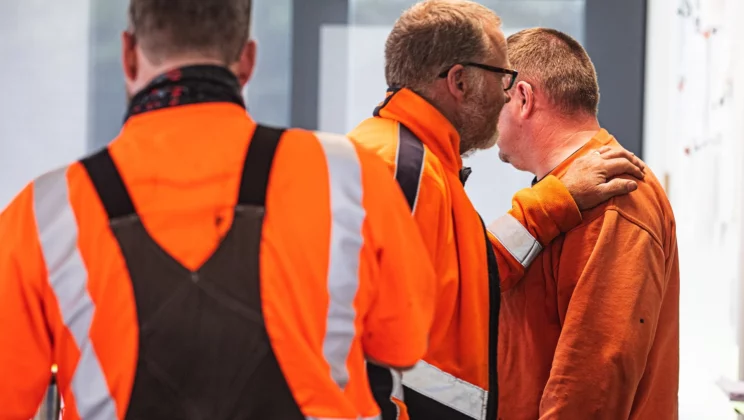
There is not always enough work for everybody. Luckily, there is a new opportunity tomorrow.
Much to be proud of
The 75th anniversary is a cause for reflection.
Reichle believes that the dock workers have much to be proud of and that the companies at the port are well looked after.
“The dock workers ensure that the jobs are performed efficiently and skillfully in line with the huge developments at the port. We have stayed on top of the task and made sure that we have the right training and skills, so we are capable of performing all the jobs that are required. Over the last ten years, we have developed our own Apprenticeship Programme. Looking back, we are proud of our achievement and believe that we are part of the success story of the port of Esbjerg,” says Reichle.
Go to overview

